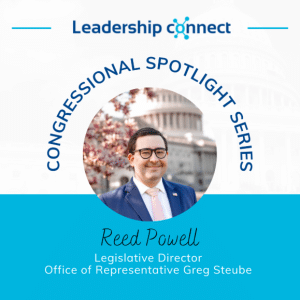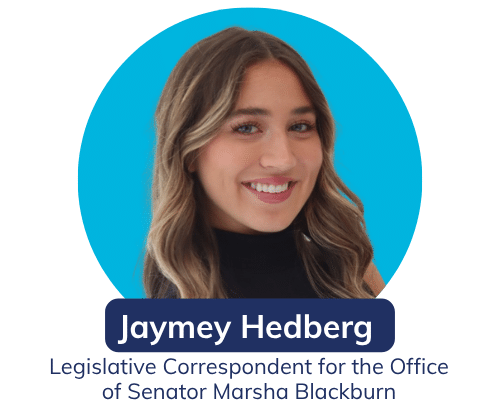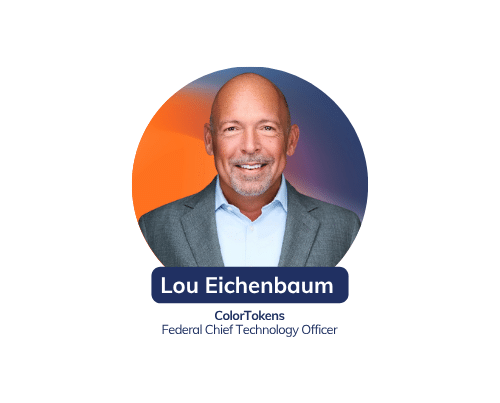Leading with Purpose, Not Just Policy

This week, we spoke to Reed Powell, Legislative Director for the Office of Representative Gregory Steube.
Can you walk us through your career path and the steps that led you to your current role as a Legislative Director?
After graduating from the University of Georgia with my BA in political science, I got a job working in the Oklahoma Legislature where I worked for a few years under a committee chairman doing largely health policy. I also did a lot of campaign work on the side, dating back to getting my first paid campaign job in high school. I went to grad school at the University of Oklahoma where I studied international affairs and got a job at a campaign consulting firm back in Georgia where one of the clients, Rep. Jody Hice (GA-10), had a job opening in his DC office that I took right after graduating with my masters.
On Capitol Hill, I started as a legislative correspondent and eventually became a legislative aide. Given Rep. Hice was retiring and everyone in my office was looking for their next job, I landed with the Committee on House Administration where I was a Professional Staff Member. During my time, I interacted with every single GOP office, which led me to joining Rep. Greg Steube (FL-17) as a legislative assistant, primarily doing health policy. I was later promoted to senior policy advisor, handling mostly his Ways & Means portfolio. A large amount of that time was spent assisting his efforts with disaster tax relief, where after a successful discharge petition (the first one in a decade and third one in over thirty years), eventually led to the first standalone income tax bill in a decade to become law. When our legislative director left soon after, I was promoted to the position.
I would say a few specific pieces of advice I would give that helped me along the way:
- As much as I hate to admit it, getting a master’s degree was very helpful. Learning to think critically, research, analyze, and comprehensively write are invaluable skills I learned.
- Never be afraid to ask questions. Internalize what you learn.
- Be proactive with the job you want to have and the office culture you create.
- Always be in a position where you are accruing experience. I had a job where once I realized it wasn’t what I wanted to do, it didn’t matter if I was there for six months or two years, I would have the same job coming out, so I left to go to another job to get the essential experience I needed for long-term career goals.
- To that point – I always tell staffers that you are compensated on Capitol Hill through three ways: money, title, and experience. If you have all three, you have a dream job. If you have one or two, leverage the opportunities you do have (like creating a portfolio of the work you have been able to do) to get the other things you want. If you have none of those three things – find a new office.
Which specific policy areas or legislative issues are you most passionate about, and how do you stay informed and engaged in those areas?
I would say the issues I am most passionate about are trade, disaster tax, elections, energy independence, multilateral diplomacy, tribal rights, Kremlinology, Medicare Advantage, and family policy / child welfare, as well as anything dealing with the congressional authority over the District of Columbia, anything in the jurisdiction of the Committee on House Administration, and federal policies that compliment or effect the decisions that state legislatures have to make.
I stay largely informed through an annoying large podcast diet that dives very deep into policy, as well as relying on the staff both in a personal office and committee to share news clippings each day.
Describe a challenging or rewarding project that significantly influenced your growth as a professional. How did you handle the challenge and how did it shape your approach to legislative work?
Without a doubt the answer to this is working on the Federal Disaster Tax Relief Act of 2023. After being tasked by my congressman to work with other offices to combine our disaster relief efforts into one comprehensive bill, the bill stalled in the House. When my boss decided to do a Hail Mary attempt through a discharge petition, I put in 110% effort and truly did a full court press on getting that over the finish line. I had made personalized palm cards for each state and eventually district, for how this bill affected them. No exaggeration – THOUSANDS – of these cards were passed out. It required talking on the phone with more than 40 House Democrat offices walking them through the bill. Had many talks with many Republican offices. A very strong whip operation was put in place. We eventually succeeded, and it was the third successful public discharge petition in congressional history. It also has seemingly kicked off a new trend as we have since seen two more successful petitions since then.
The truth is, when the Member you work for is very passionate about doing something good, it becomes much easier for the staff to match their energy. I worked in good faith with many offices we probably don’t agree on a lot politically, but on an issue like disaster relief, politics are put aside for the greater good. I grew as a staffer a lot in that short period of time, and through staying on the ball, eventually the Senate took up the bill which passed unanimously and was signed into law with Joe Biden’s autopen.
Being able to see a bill go from being an idea, to being stonewalled by every imaginable force, to passing committee, to enlist the help of people from across the political spectrum, to go through the process of that is the United States Senate, and see a bill become law to deliver real relief to millions of Americans is a true privilege and has shaped my growth as a professional profoundly.
In your role as Legislative Director, strong leadership is essential for keeping the team motivated and focused on the office’s agenda, especially when navigating numerous issues. Could you share some strategies or techniques you employ to inspire and motivate your team, ensuring that everyone remains committed to achieving the office’s objectives despite the challenges they may face?
The most important thing in a congressional office is to have high expectations and a long leash. Give staffers grace to operate and make decisions. I hear horror stories on Capitol Hill of management and culture. In my opinion, if you give staffers 5-10% slack, you can get 33% more work out of them. Have grace and patience while clearly setting expectations. That was the office I stepped into when I was junior, and I maintain that same standard.
Always make yourself accessible to staff. Take the time to walk through and answer every question someone may have. When I was an LC and had a thousand questions, I had an LA and LD who much patience with me had so (thank you Regan and Nathan!) to explain and walk through every hypothetical I could come up with. I always try to extend that same courtesy. Always, always, always have grace with others.
Finally, it’s always important to know what hill you are going to die on, and make sure the staff around you know what hills they will die on too. If you die on every single hill or try to fight every single battle, you will get burnt out and crash. Always know what the mission is: your fights are advancing your member and district’s best interests. Have the peace of knowing it is not your name on the front door and when you really accept that, it makes your service to your district that much easier and creates a more positive work environment.
What do you believe sets Capitol Hill apart as a unique work environment, and how do you navigate its challenges in your everyday work?
What is unique about Capitol Hill is that every office is different – and it should be! This place represents all walks of life from across the entire country. Conformity is against the nature of this place. Each member and district have their unique challenges and interests and navigating through that is not easy.
Having previously worked in a state legislature; I would say that Capitol Hill is preferable to me in terms of how long it takes it get legislation passed. No, that’s not a typo. Working in a state legislature, it was appalling at times how quick something could become law or how sneaky something could be done, or the personal politics of individuals actually influencing state law (which creates a very toxic work environment for the entire institution). To me, having seen that side of the coin, I have much patience with how slow Congress moves at time. Our Founders were correct in how they established our national legislature, even if it takes a long time to get something done. The errors that occur are that of human nature, not of technical design.
Leadership often involves guiding and mentoring others. Could you share a specific example of how you’ve supported the professional development of your team members, helping them grow in their roles and excel in their skill sets?
I am all about making sure staffers attend as many events as possible. As long as there isn’t something pressing to do, yes, go to that four-course training on Senate procedure. Go to that box lunch briefing on medical device equipment. Absolutely you should go to that reception in the Rayburn Foyer on the cement industry. Take advantage of every possible opportunity this place offers. The development is out there; go seize those opportunities.
Word association, what is the first word that comes to mind for each of these?
Policy – purposeful
Networking – network to get work
Writing Skills – ESSENTIAL
Working on the Hill – a privilege
Leadership Connect – informative






